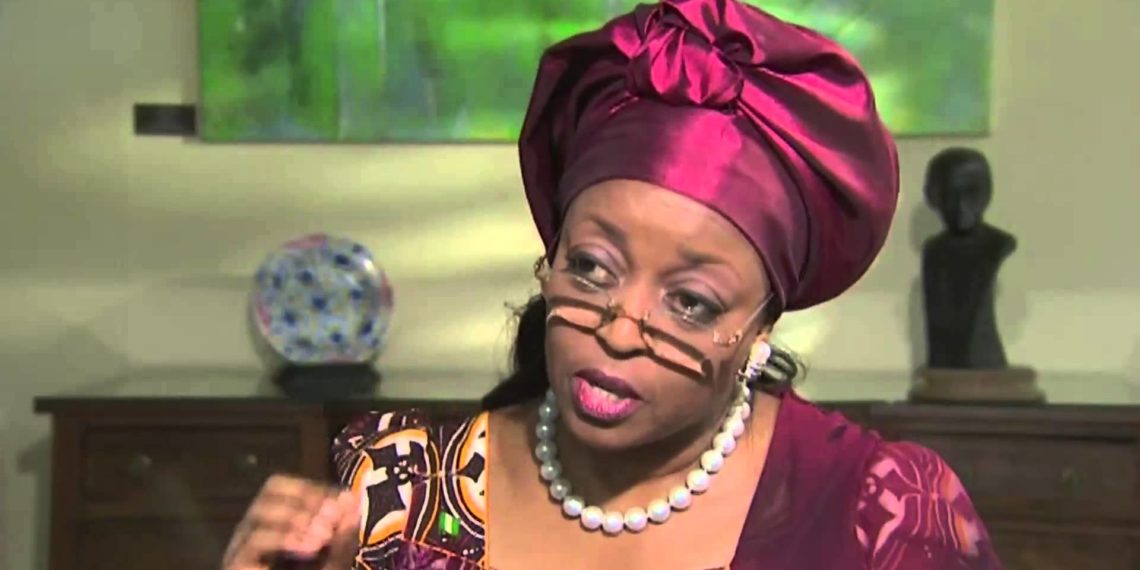Diezani paid $865,300 cash for jewellery – EFCC tells Court
A Federal High Court in Lagos Monday heard that a former Petroleum Resources Minister, Diezani Alison-Madueke allegedly paid $865,300 in cash for jewellery from a seller on Banana Island, Ikoyi, Lagos.
The Economic and Financial Crimes Commission (EFCC) told Justice Nicholas Oweibo that Mrs. Alison-Madueke did not acquire the items with her salary or any part of her legitimate income.
The anti-graft agency made the claims while seeking the permanent forfeiture of 2,149 pieces of jewellery and a customised gold iPhone, valued at $40m, recovered from her Abuja home.
But Diezani opposed the commission’s prayer on the ground, among others, that the seizure of the items amounted to a violation of her constitutional right to own property.
The court, on July 5, ordered the temporary forfeiture of 2,149 pieces of jewellery and a customised golden iPhone recovered from Alison-Madueke’s home.
According to the EFCC, which obtained the order, the items were suspected to be bought with illicitly acquired funds.
Justice Oweibo fixed yesterday to hear pending motions.
When the matter was called, prosecuting Counsel Rotimi Oyedepo told the judge that it was in the best interest of justice for the jewellery and the gold iPhone to be permanently forfeited to the Federal Government.
He said the court was empowered to make such forfeiture order under Section 17 of the Advance Fee Fraud and Other Related Offence Act 2006, because “the respondent’s known and provable lawful income is far less than the properties sought to be forfeited to the Federal Government of Nigeria.”
He supported his application with, among others, an affidavit deposed to by an EFCC investigator, Rufai Zaki.
Zaki recalled that Alison-Madueke was appointed Minister of Petroleum Resources on April 12, 2010.
He said EFCC findings showed that she started acquiring the jewellery in 2012 from one Bukola Oyewumi of Trinket Box Bespoke Jewellery at Ikeja City Mall, Alausa, Lagos.
The investigator said the commission was in possession of details of the United Bank for Africa (UBA) account through which Alison-Madueke received her salary as a minister.
“The respondent did not utilise her salary or any part of her legitimate income to acquire the assets sought to be forfeited to the Federal Government of Nigeria,” Zaki said.
He averred that a “damning intelligence report” received by the EFCC led to a search of Alison-Madueke’s house at No. 10 Fredrick Chiluba Close, Asokoro, Abuja.
Zaki’s said the EFCC invited Oyewumi and she made a statement, saying she started selling jewellery to Diezani in 2012.
According to Zaki, Oyewumi also made available to the EFCC the invoices issued in respect of the jewellery in which ‘Aunty D’ was written as the buyer.
He said the EFCC also discovered that apart from Oyewumi, Alison-Madueke also bought jewellery from one Minal Ratanani of Bella Vista Apartment, Banana Island, Ikoyi, Lagos.
According to him, Ratanani admitted during questioning by the EFCC that Alison-Madueke bought jewellery worth $865,300.00 from her over a period and the former minister paid cash.
But Alison-Madueke, through her counsel, Nnamdi Awa-Kalu, challenged the court’s jurisdiction to hear the suit.
She insisted that the seizure of the items amounted to a violation of her right to property under sections 43 and 44 of the 1999 Constitution and “to appropriate them at her discretion”.
She further contended that the EFCC should not have the power to barge into any Nigerian’s home, seize their property and come to court to claim that the property is illegal.
Mrs. Alison-Madueke, who is said to be under investigation in the United Kingdom (UK), urged the court to reject EFCC’s prayer to permanently forfeit the jewellery and the golden iPhone to the Federal Government.
The former minister contended that the court lacked jurisdiction to grant the interim forfeiture order, besides the EFCC did not charge her with any crime or serve her with any summons.
Following the conclusion of hearing, Justice Oweibo adjourned till September 10, 2019 for ruling.
According to a schedule attached to the application, the jewellery, categorised into 33 sets, include “419 expensive bangles and 315 expensive rings”.
Others are: 304 expensive earrings, 267 expensive necklaces, 189 expensive wristwatches and 174 expensive necklaces and earrings.
The rest are: 78 expensive bracelets, 77 expensive brooches and 74 expensive pendants. (The Nation)


